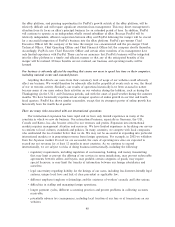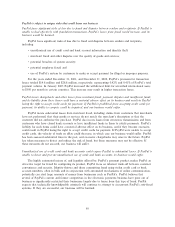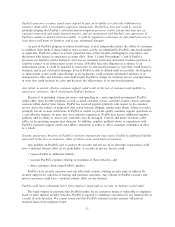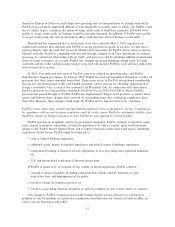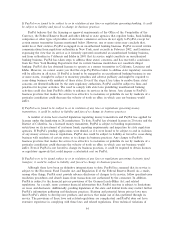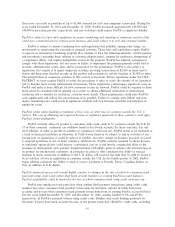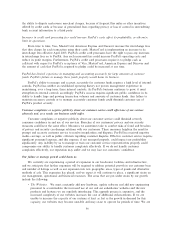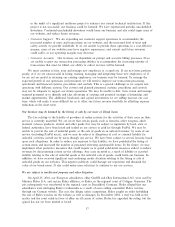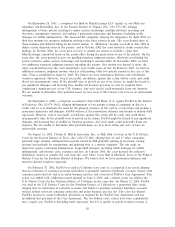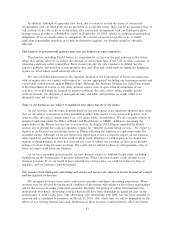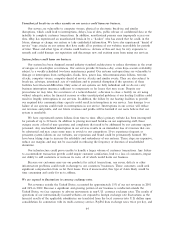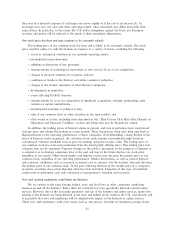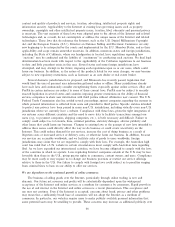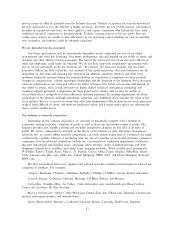eBay 2002 Annual Report Download - page 60
Download and view the complete annual report
Please find page 60 of the 2002 eBay annual report below. You can navigate through the pages in the report by either clicking on the pages listed below, or by using the keyword search tool below to find specific information within the annual report.On September 26, 2001, a complaint was Ñled by MercExchange LLC against us, our Half.com
subsidiary and ReturnBuy, Inc. in the Eastern District of Virginia (No. 2:01-CV-736) alleging
infringement of three patents (relating to online auction technology, multiple database searching and
electronic consignment systems) and seeking a permanent injunction and damages (including treble
damages for willful infringement). We answered the complaint, denying the allegations. In April 2002, we
Ñled four motions for summary judgment relating to the three patents in suit. The court denied three of
those motions and deferred ruling on the fourth motion. A ""Markman'' hearing was held in July 2002 to
deÑne certain disputed terms in the patents, and in October 2002 the court issued its claim construction
Ñndings. In October 2002, the court gave us leave to amend our answer to include a claim that
MercExchange committed fraud on the patent oÇce during the prosecution of one of the patents. On the
same date, the court granted in part our pending summary judgment motion, eÅectively invalidating the
patent related to online auction technology and rendering it unenforceable. In November 2002, we Ñled
two additional summary judgment motions regarding the patents. One motion was denied as moot; the
other was denied because the court found there were triable issues of fact. In February 2003, we Ñled an
additional summary judgment motion, which is still pending. Only two patents remain in the case at this
time. Trial is scheduled for April 22, 2003. We believe we have meritorious defenses and will defend
ourselves vigorously. However, even if successful, our defense against this action will be costly and could
divert our management's time. If the plaintiÅ were to prevail on any of its claims, we might be forced to
pay signiÑcant damages and licensing fees, modify our business practices or even be enjoined from
conducting a signiÑcant part of our U.S. business. Any such results could materially harm our business.
We are unable to determine what potential losses we may incur if this lawsuit were to have an unfavorable
outcome.
On September 6, 2002, a complaint was Ñled by First USA Bank, N.A. against PayPal in the District
of Delaware (No. 02-CV-1462) alleging infringement of two patents relating to assigning an alias to a
credit card so as to eliminate the need for the physical presence of the card in a transaction and seeking a
permanent injunction and damages. PayPal believes it has meritorious defenses and intends to defend itself
vigorously. However, even if successful, our defense against this action will be costly and could divert
management's time. If the plaintiÅ were to prevail on its claims, PayPal might be forced to pay signiÑcant
damages and licensing fees or modify its business practices. Any such result could materially harm our
business. We are unable to determine what potential losses we may incur if this suit were to have an
unfavorable outcome.
On August 16, 2002, Charles E. Hill & Associates, Inc., or Hill, Ñled a lawsuit in the U.S. District
Court for the Eastern District of Texas (No. 2:02-CV-186) alleging that we and 17 other companies,
primarily large retailers, infringed three patents owned by Hill generally relating to electronic catalog
systems and methods for transmitting and updating data at a remote computer. The suit seeks an
injunction against continuing infringement, unspeciÑed damages, including treble damages for willful
infringement, and interest, costs, expenses and fees. In January 2003, the court granted the collective
defendants' motion to transfer the case from the court where it was Ñled in Marshall, Texas to the Federal
District Court for the Southern District of Indiana. We believe that we have meritorious defenses and
intend to defend ourselves vigorously.
On February 20, 2002, PayPal was sued in California state court in a purported class action alleging
that its restriction of customer accounts and failure to promptly unrestrict legitimate accounts violates state
consumer protection law and is an unfair business practice and a breach of PayPal's User Agreement. This
action was reÑled with a diÅerent named plaintiÅ on June 6, 2002, and a related action was Ñled in the
U.S. District Court for the Northern District of California on the same day. On March 12, 2002, PayPal
was sued in the U.S. District Court for the Northern District of California in a purported class action
alleging that its restrictions of customer accounts and failure to promptly unrestrict legitimate accounts
violates federal and state consumer protection and unfair business practice law. The court has denied
PayPal's motion to compel individual arbitration as required by the PayPal User Agreement and has
invalidated that provision of the User Agreement. The two federal court actions have been consolidated
into a single case. PayPal is defending itself vigorously, but if it is unable to prevail in these lawsuits, it
58


